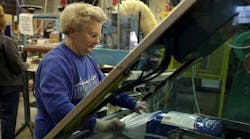They are smart, willing and they are growing in numbers. While this can apply to millennials, and it does, it also applies to the mature worker.
While overall, the United States labor market is projected to grow at an average rate of 0.6% per year between 2016 and 2026, the 65–74 age group is projected to grow by 4.2% each year, and the 75+ worker group is projected to grow by 6.7% annually.
“This trend is tilting overall workforce demographics toward the high end of the age spectrum, and the impacts of the aging workforce can already be seen at the individual, organizational, and societal level,” according to an article by Deloitte, “No time to retire.”
Either by choice or by need, 85% of today’s baby boomers plan to continue to work into their 70s and even 80s.
Given this new demographic, Deloitte outlines some benefits mature workers bring to employers.
Engagement and Grit Levels Increase with Age
Compared to other generations, baby boomers they tend to persist longer and have more engagement in their work. And engaged worker groups performed better across a variety of important business metrics, yielding 21% higher profitability, 40% higher quality and performing 70% better in terms of safety.
Work Quality Improves with Age
While stereotypes about age-related rigidity and cognitive decline abound, research shows that age and core task performance are largely unrelated. In fact, certain skills that can help older workers provide unique value to their organizations, such as social skills, can actually improve with age. Furthermore, studies have shown that older workers can be just as creative and innovative as younger employees.
Mature Workers tend to DisplayStronger Organizational Skills
Research has shown that older workers are more likely than younger workers to demonstrate positive organizational citizenship. They tend to show up on time, avoid gossip, help their teammates, and keep their frustrations in check. They are also recognized for attributes such as loyalty, reliability, a strong work ethic, high skill levels, and strong professional networks.
Experienced Workers Can Help Fill the Talent Gap
Given experience is a critical asset right now, older workers are in vogue. According to author David DeLong, this experience makes older workers more likely to possess three types of knowledge in particular: human, social, and cultural. Human knowledge relates to skills or expertise specific to a role, such as a legacy system or tools, while social knowledge relates to relationship skills. Cultural knowledge is a combination—it is the understanding of how things actually get done in an organization.
To read the full article please click here.



